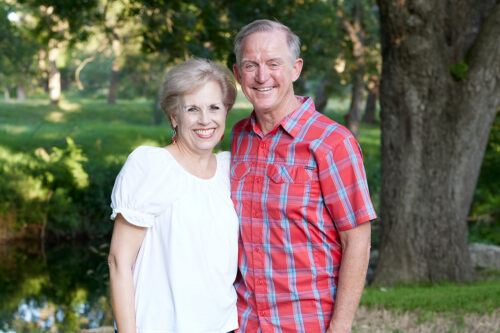What are the barriers to human flourishing in our city? That was the question the mission committee considered when it was tasked to determine the best way to spend $100,000 allocated to it this spring. The money was part of Covenant’s 2020 budget surplus.
“Our committee members agreed that the most visible barrier is homelessness,” Mission Director Whitney Bell said. “Prop B was the biggest thing in the area news when we were discerning how to best spend this money. We knew that these funds needed to go toward navigating homelessness in our city.”
Proposition B, which passed a city-wide vote in early May, made it a class C misdemeanor for anyone to sit, lie down or camp in certain public areas. When Prop B passed, many of Austin’s homeless were moved out of camps around the city, leaving them with nowhere to go.
Though the mission committee quickly decided to provide funds for Austin’s homeless, determining exactly how to do that was trickier. “We wanted to put our money where our mouth is and we also wanted to help homeless organizations beyond our normal partners,” Whitney said. “I contacted Street Youth Ministry founder and Covenant member Terry Cole to find out what local missions were doing this well.”
Terry, with more than two decades of experience working with the homeless near the University of Texas campus, is uniquely positioned to provide advice and insights on what organizations are best meeting the needs of the area homeless. “Because of Street Youth, Terry has a great pulse on homelessness in Austin and understands what services help people and what services are more of a Band-Aid. I wanted to hear his perspective,” Whitney said.
Terry’s advice was to look for groups that are doing wrap-around services “It is one thing to get people housed,” Terry said, “but they often end up back on the streets because of addiction or joblessness.”
Covenant mission committee member Paul Mowry also did some legwork to help find organizations helping area homeless. Paul chairs the board of the directors of the Religious Coalition to Assist the Homeless (RCAH), an unusual partnership between the city of Austin and nearly 150 places of worship. It was created to reduce the population of homeless downtown. Through a 1997 city ordinance, churches are allowed to divert the portion of their utility bills designated as “drainage fees” to the coalition. RCAH’s 2021 total grant budget is just over $840,000. That money provides funds for 21 organizations that work on behalf of Austin’s homeless.

This spring, those 21 organizations provided the RCAH board with written reports on what they were doing, what their financial needs were, and how they would use additional funds. Paul shared that report with Whitney. She found that four of the organizations in the report offered wrap-around services. That led to an idea.
“I proposed to the mission committee that we give funds to those four organizations, and they loved it,” Whitney said. “These organizations are doing work outside of what our mission partners are doing, and they needed funds that added up to exactly $100,000.”
Covenant gave money to these four organizations: Sunrise Homeless Navigation Center, Trinity Center, Foundation for the Homeless and Front Steps.
Sunrise Homeless Navigation Center received $40,000.
Sunrise, which opened in 2015, is a one-stop shop serving the immediate needs of its homeless clients and connecting them with other agencies addressing their specific needs. This year, the number of clients Sunrise serves tripled. Covenant provided funds an additional staff member at $40,000 to increase capacity and lighten the current staff’s workload.
“The drastic change in our overall client base is probably one of our greatest challenges and successes,” Sunrise reported.
Foundation For the Homeless (FFH) received $21,000.
This organization finds permanent homes for area homeless. Formerly FFH managed the Interfaith Hospitality Network, an organization of churches – including Covenant – that provided temporary shelter for families. FFH leaders determined that moving families from place to place was inferior to providing a more permanent shelter. FFH serves, on average, 59 households per year with an average of four family members. For each family it houses, FFH provides a home kit at the time they move into their own apartments or homes.
“Our most urgent need today centers on items that our grant funding limits or are classified as unallowable costs,” FFH reported. “Most families need everything to restart their household – furniture, basic household items (kitchen, bath). Any item FFH buys reduces the available funding the family may need for other essentials including rent, utilities and moving costs. Having additional funds or in-kind donations to create these ‘home kits’ is an ongoing struggle.”
Trinity Center received $30,000.
The downtown-located Trinity Center works with clients – women, in particular – mainly from the nearby the Austin Resource Center for the Homeless (ARCH). In June 2020, Trinity started offering rent and/or utility bill assistance through the pandemic, reflecting Trinity’s wish not to increase the number of homeless people due to Covid 19. Trinity anticipated that this new rent/utilities service would cost an additional $30,000 through the end of 2021. It was not budgeted.
In its report to RCAH, Trinity described a client. A family immigrated from Egypt two months before the pandemic, with plans to open a rug business. “This family never needed help like this in their lives. When they came to us and saw the line of people waiting for a meal, [the mother] said ‘I see what you do. When we will get back on our feet we will come to help you.’”
Front Steps received $9,000.
Front Steps is the administrator of the Austin Resource Center for the Homeless (ARCH). The ARCH and the Salvation Army care for the largest contingent of street people who need temporary overnight shelter. Covenant’s $9,000 donation is going toward the remaining 2021 cost of purchasing discounted bus tickets and securing IDs; the latter are required for job and apartment seeking.
“A simple donation to help us purchase IDs and bus passes will have a huge impact for the residents of Austin who are transitioning from homelessness into housing,” the ARCH reported.
“This is an amazing opportunity for Covenant to recognize the issues, the barriers to flourishing right here in our city, and provide the funds to groups on the front lines that are working to make a dent in this problem,” Whitney said.
Please visit our mission page for more information about ways Covenant is striving to serve our community well.




